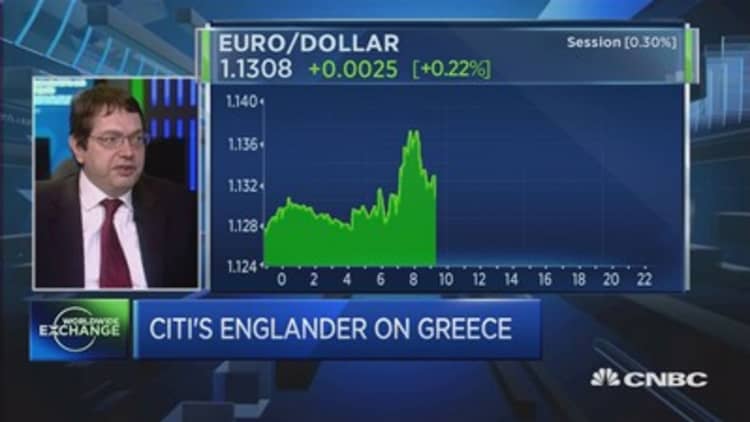
As talks between Greece and its creditors over a much-needed aid deal drag on, Athens may risk running out of supporters.
Greece said on Wednesday that its international creditors had not yet responded to its latest proposals to break the deadlock on a cash-for-reforms deal. European Union officials reportedly view the Greece's suggestions as insufficient, throwing doubt over a planned meeting between Greek, French and German leaders in Brussels on Wednesday.
"Talk is that the European Commission, and (European Commission President Jean-Claude) Juncker in particular, is starting to lose patience with Greece—and it was seen as less harsh on Greece than the other creditors," Jonathon Loynes, chief European economist at Capital Economics in London, told CBNC.
"I'm not sure what this amounts to but it doesn't bode well for a deal being reached quickly," he added.
Signs from Greece's European bailout supervisors have been mixed over the last week.
Sources close to the bailout talks said that Greek Prime Minister Alexis Tsipras and Juncker had met on Wednesday and "exchanged views in detail and in a constructive atmosphere and agreed to meet tomorrow."
Media reports on Wednesday also suggested the European Central Bank had raised the cap on emergency liquidity that Greek banks could tap from the country's central bank. There were also rumors that Germany might be willing to offer a staggered deal on aid, settling for just one Greek reform upfront.
On the other hand, the tone of comments from officials has turned more negative in the past week, suggesting that Greece may be running out supporters.
At the Group of Seven (G-7) meeting of world leaders in Germany earlier this week, German Chancellor Angela Merkel warned that time was running out for Greece.
U.S. President Barack Obama said Athens needed to make some "tough political choices that will be good for them long-term," in comments that highlighted concern among global leaders about the impact a crisis in Greece could have on the global economy.
The talks between Greece and its international lenders are aimed at unlocking 7.2 billion euros ($8.13 billion) from a bailout agreement – the terms of which are due to expire at the end of this month.
"The mood in Brussels certainly does seem to be changing with talk that the EU Commission, which had been broadly supportive of Greece, was starting to lose confidence in the prospect of a deal," Michael Hewson, chief market analyst at CMC Markets, said in a note on Wednesday.
The Greek government, led by Alexis Tsipras' anti-austerity Syriza party, has said it would not agree to any deal that crosses "red lines" such as hiking taxes and privatising strategic assets.
Read MoreWilbur Ross: Greece will make a deal, but ...
"The fundamental issue is that his (Tsipras') idea of reform is different to everyone else's idea in Europe," Steven Englander, global head of G-10 FX strategy at Citi, told CNBC. "He wants a stronger and bigger public sector and the view among the institutions is that Greece needs more private sector activity to help growth get back."
Robin Bew, managing director at the Economist Intelligence Unit, told CNBC his greatest concern was a potential collapse in the Greek government, given pressure it faces from within the Syriza party to make no concessions on further austerity.
"The biggest worry is that, even if there is a deal, we don't see how the Greek government can survive it over the long-term because the compromises they would have to make to secure a deal would put the domestic situation in a place that you would probably get the government collapsing," he said.



